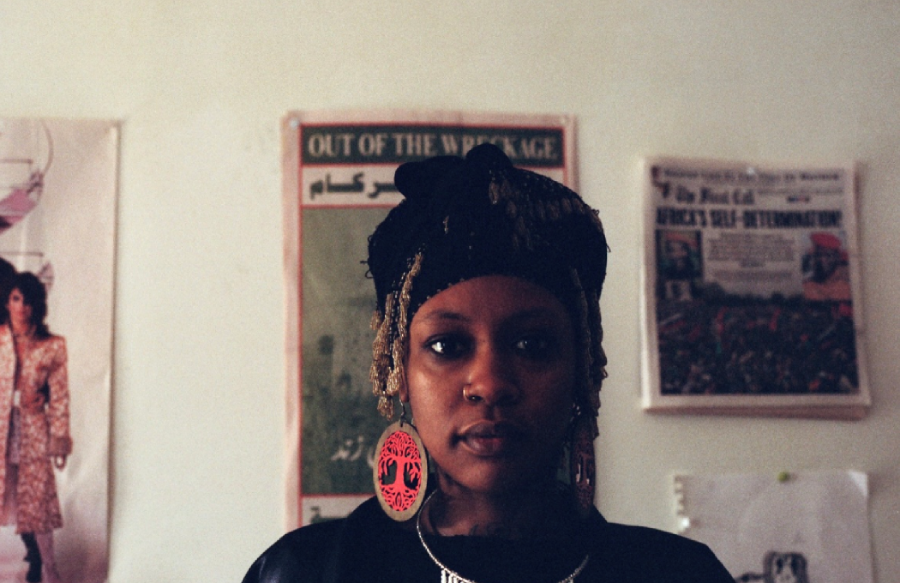
While we still love/live to blog, Finals has also been busy with other projects this summer. Like our new compilation album as well as the Generator event series with Laron, at CWW Radio Shop in Crown Heights (next one Sep. 21 with Finals fam kimila and the legend dj blackpower).
Generator came from Finals doing events at Radio Shop prior, and one of those loose and chill nights is when I met Tyler Burston, aka the rapper Merkeba. He expressed interest in writing, and now months later here we are. I am so grateful for that meeting, and inspired that this blog, and free events and careful curation, can draw likeminded community. I am lucky to publish Tyler and excited to focus on the artist he chose, 1Alkebulan, as an interview subject.
One listen to 1Alkebulan's new album La Femme Du Village and you'll understand this is major music that is deeply connected to multiple lineages but also profoundly doing its own thing. But I'll let Tyler and 1Aklebulan talk about that. Enjoy the interview. And because Finals loves a first: do also appreciate the film photography by C.B. Rucker, my friend whom I sent on his very first "professional" photography mission to 1Alkebulan's apartment while they practiced for their show in Brooklyn 8/13. Sometimes your next creative partner is already the homie, and you didn't even realize what they could do.
-Andrew
Upon entering the apartment of 1Alkebulan, born Shara Ali, I was struck with the thick smell of Nag Champa incense. It lingered through every floor of the building, comforting, and deeply familiar, reminding me of childhood memories in my grandparents’ home. Walking into their room, I was welcomed by a vast collection of reference texts larger than my head, vinyl records, and a pair of four foot tall speakers that resemble engraved totems. “Erudite” and “earthly” are the words I would use to describe the space, and their music reflects those same elements.
1Alkebulan is a singer and producer from Washington D.C, who has lived in Brooklyn for the past nine years. They refer to their most recent music as“Afro Dance”, a term that fits in its expansiveness, as so much of their work eludes generic description. Their 2024 album A Bowl for Lilith became my most spun project of last year, easing me through a year full of rough transitions and 90 minute commutes. On July 18th, they released their newest album La Femme du Village, showcasing their evolution sonically, personally, and in artistic sensibility.
Our conversation took us through the origins of Shara’s practice, the influence of scholarship on their life and art, the intricacies of Black life in D.C, and the importance of musical self determination in the struggle against capitalism and patriarchy.
-Tyler Burston
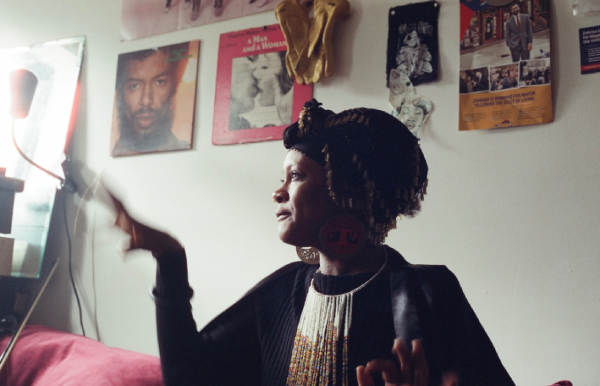
You seem like a very studious person, both in the way you approach your craft and speak about the world in general. What would you say your musical background is? What type of things did you grow up doing?
MS Paint. That’s where it all started, just being able to have that tactile computer to hand skill. When I made something on the computer, I was able to play with color , shape, even texture, being able to cut parts out of the image and fill it with more paint. That was my first serious art experience as a little one. I went from there and tried figuring out other parts of digital art. I think it translated into my want to play games online without an end result. I wasn’t the kid who always wanted to beat Bowser, but if I was able to make my My Scene bedroom beautiful, it gave me the same feeling that I got with MS Paint.
I was able to translate those skills to eventually try and figure out how to do this with sound. As far as my digital music production style, I try to take the same avenue. As far as my voice goes, my aunt is a world renowned opera singer and Broadway actress named Sumayya Ali. I was going to her recitals at the Boston Philharmonic and the Kennedy Center, these beautiful shows where I’d see this hijabi in adorned African dresses and Chinese headdresses singing music that sounded so ancient to me. I would talk to my grandma and say “I wanna do that."
My grandma heard me one day mimicking her, at 4 years old, and she was like “well, there’s something there." I was not the best singer, I was never the most talented person, but I worked really really hard to develop the skills I have. My family comes from a scholastic background. My grandmother was an English teacher. My grandfather was a Howard professor. They were both very artsy people. My granddad did local theater in the '80s in Kansas, and my grandma was always throwing on some type of production. We apply the same sciences of learning and adapting and translate that immediately into the arts. Every kind of art I do, I take a kind of scientific approach to see what works and doesn’t work and come to a conclusion. That’s why at the end of my tapes you usually hear a reference, conclusion, or school of thought. A Bowl for Lilith was about the slavery of fantasy and being a slave to your own mind and the mind of others. On La Femme Du Village, I tried to calm down--not calm down--but remain wise and ethical while fighting a beast so ugly.
I feel like the cover says that. I never formed one interpretation of what A Bowl for Lilith, or any of your projects, “meant," but what you’re saying now makes sense given its art and lyrics. For La Femme Du Village, the cover says exactly what you just explained. When I listen to the album, I still don’t feel like I get one concrete “meaning” or interpretation, but only because I’m not expecting the album to reveal itself to me so linearly. Everytime I listen to it, it makes me want to listen more. Almost like when you read a dense text, you end up wanting to go over it again and again, but in a pleasurable way. It’s like “naw, I need to really know what was there." I see the academic background show up in your willingness to go into meticulous levels of detail if that’s what’s necessary.
With the goofiest possible sample!
Exactly! Cause when you’re at the academic level, you don’t care about all this other stuff. If that’s where you landed--that’s where you landed. I’m gonna use this to transition into my second question. I remember on Instagram at some point, you posted, essentially a written out framework for how you produce yourself. Could you talk more about your processes and what it’s like being a self produced artist?
Exactly. For one, thank you for acknowledging that. I’m trying not to cry. I come from a D.C. underground as you might know, and I’ve said this in several interviews, but there was always this expectation of if you were working on music for free with a producer, that producer might try and pull a fast one. If I go to the group setting back in the day, I was not taken that seriously cause I was a young Ellington kid cuttin’ class to try and make a quick record. There would be times where I would be trying to figure out my sound, tracking tracking tracking practice practice practice, and they didn’t understand the concept of drilling to get the proper sound. Halfway through the session, these…..loving people……would delete whole projects on me, like “oh yeah the computer just crashed." I don’t know, they just didn’t feel like recording me no more. So I took my power back.
And in that taking of power back, I wanted to make what I liked instead of what sounded immediately approachable. I understand why people do that, to make money in the art and travel the world and be understood by the masses. But I think we stop pushing the needle on creation once we start doing an endless copies. Now iteration and understanding the concept of repurposing, that’s sampling. I would even go as far as to say I vocally sample the technique of Frank Ocean, but that’s as far as I would go in that effect. I feel moreso, when it comes to mental criteria, I would never take from any other individual cause they’ve never had my brain and I’ve never had their brain. So I feel like sonically you can go to the same place, you can create sounds from somebody’s childhood, but that kinda feels like reading somebody’s diary and tryna write a passage out of it.
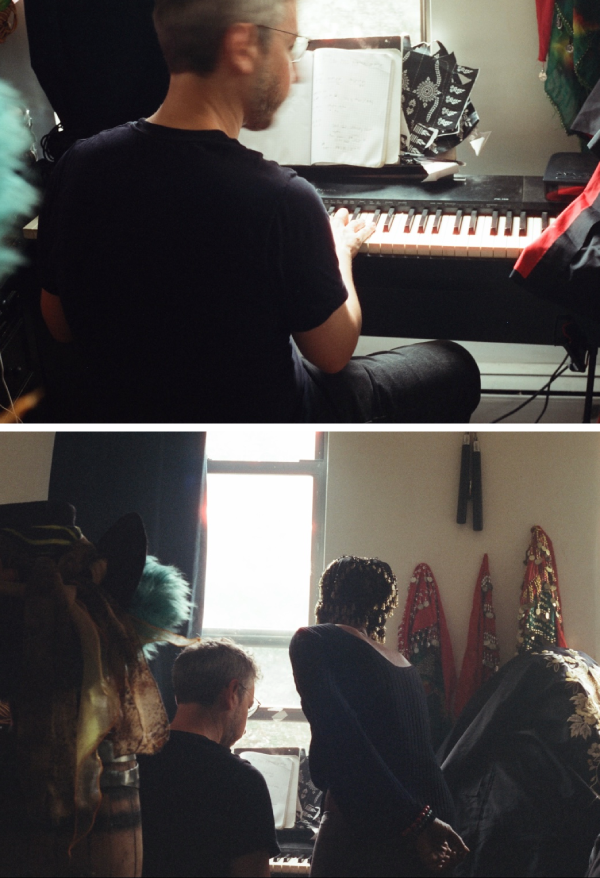 Carlos Truly on keys
Carlos Truly on keys
Yeah I feel you. We gotta go for something else. Something that’s very much us.
Exactly. And so with this most recent tape, you’re hearing samples from my childhood. Some things are a little newer like…not even newer, but some things are more Black to the Future, and some more ancient sounds. I sampled a Mauritanian song. That sound felt familiar in my bones from being from the continent, but technique wise, I was also cutting up Missy Elliott.. I still have my NoVa ear, my D.C. ear, a little touch of Maryland ear on that third song. I listen to what I like and I make what I can by pulling from as many places as possible to make a new product out of what I have.
That’s evident. That’s what really got me about the music, the liberal use of African rhythms and melodies. I don’t hear people do that at all. You’ll hear people flip a Nigerian sample, but in your work you’ll find sounds you only hear in spaces that are specifically African. I’m hearing your musicality be very comfortable in that sonic space while, in terms of all the textures and colors, the music feels very hip hop. I think those elements come together in a way I would describe as “psychedelic." Your work creates a sense of intimacy, because you’re willing to be intimate with yourself and your own personal history. You’re willing to put the time in.
You wanna hear something funny. When I was a kid, I watched the “Green Light” video by Beyonce, and I thought she played every instrument. I thought that she made all the dance moves and did her own hair and did her own makeup, and made her own things. I was like “I wanna be like Beyonce!” I had no clue. I saw a picture when I was 16 of the team that wrote “Partition." It took 30 people to write that song. Shout out what that did for people, alhamdulillah, but I started listening to people more like Prince and Janelle Monae afterwards cause I was like “okay, now I know that this is not a thing.” Obviously, she never said that, I made that up in my own head.
But that’s what you wanted to be.
That’s what I wanted for her. I wanted that for Black women, period, cause I come from women that do that. My aunt did her own makeup, her own glam, she was a dance instructor, she used to belly dance, all that. So I thought this was the standard. Everybody got their ways, but I wanted that for myself, and I want that for more people, to be more self produced and have more autonomous control over what they produce and create. I think that will make art that reflects the times that we live in and a more honest perspective. We don’t exist in a space where that’s really wanted anymore because people are scared. They want to make money. That’s trickled down to the underground, which is a space where people were supposed to be vulnerable and get their ideas off--like “it's some crazy shit going on, lemme write this song and pull out this banjo and figure it out." From the genesis of recorded music, I could definitely tell that there was space for people to make their bigger pieces, but in the underground, you had Zora Neale Hurston going down South to record these old folk songs and folktales. That changed how people listened to a lot of rock music and blues music and it gave birth to so much. I want us to have some more of that in the underground, and not from the perspective of someone else who is more popular.
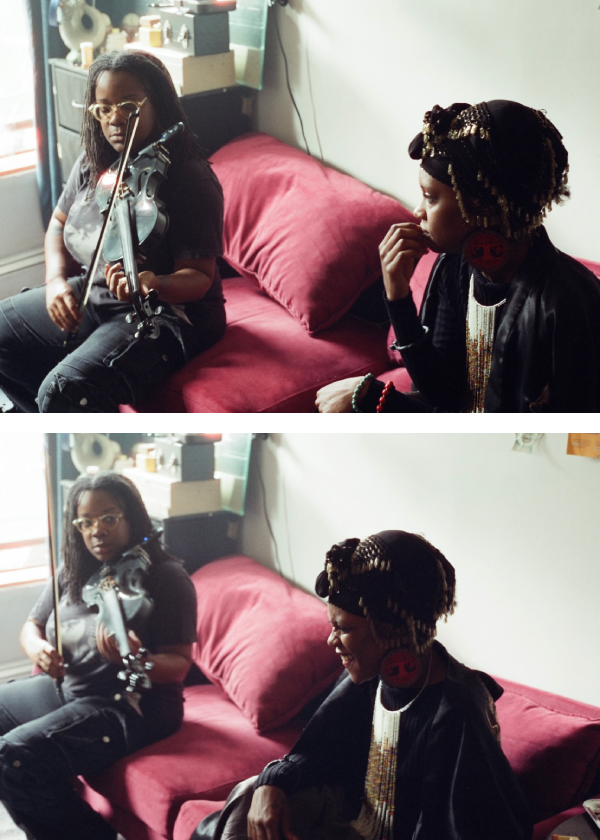 Leandria Lott on violin
Leandria Lott on violin
Looking at you and other artists from DC like Sir E.U, Nappy Nappa, and Miles Ave, you all sound distinct to me. Both from each other and the rest of music at large. There also seems to be an influence of Black consciousness on y'all’s music. What about growing up in D.C. allowed you to be that way?
I would say broadly as a city, we have a lot of African movements that came out of us, from the '60s and on. Even earlier with the Moorish Science people and all that stuff, really since Black people been on the up and coming scale there. My specific community is the Masjid Muhammad community in Washington D.C, Mosque No. 4. Malcolm X put in some bread to get us built up. He was one of the first Imams to step through there. I would say that community influences a lot of my approach to speech and verbiage. I got to hear the sound of an A.M.E pastor preaching Black consciousness, coming back to oneself. I heard very simple, sensical speeches as a young child that influenced my demeanor, who and how I wanted to be in society. What reflection I wanted to be of my people. I think the further I got away from it, the further I lost connection, not just spiritually, but with the Black community that I knew and grew up with. I feel like I’ve made a lot of interesting art in that time. I think it did push the envelope, but I feel it also, you hear those songs fighting to get back to something. No one knew, I didn’t know what it was. But being back in my community--especially here in Bed-Stuy, all of these Black Muslims, African Muslims, and us being in the same community. That was another thing, too. At my mosque you got POCs every color, a few white people even. I got to interact with Bengali people, Palestinians, North Africans, Egyptians, Middle Eastern people, East African Muslims, West African Muslims, South African, so many broad groups of people.
To get back to the conversation about bigger DC and my community, you got of course the A.M.E community, you got Shiloh Baptist, you got the Kemetic people, you got the Adinkra people, the Farafina Khan, all sorts of Black groups. We are not separate at all, aside from somewhat in ideology, but culturally--there’s our stuff, and then there this general D.C. Black-ism that just embedded with all those cultures living next to each other, us going to the same Pan African schools, us going to the same public schools, us at the gogo. I feel like that’s a never ending stream of consciousness and kinda why we’re so Black to the Past, Present, and Future. I think it’s inescapable when you’re from there. You just are.
What you’re describing reminds me a lot of Brooklyn before gentrification. I think you see the influence of Black consciousness groups on the NY underground today, as well as society and culture in general. My own family was immersed in that, and with a lot of the young Black artists in New York you can see that same ancestry.
It’s so funny, they be so shea butter and incense down they can’t even smell it on they own skin. It’s beautiful. You gotta go out there and figure shit out, and if you come back home alhamdulillah. If you don’t, you don’t, and there’s another community out there that will nurture you. There’s different types of conglomerates, and I give people the space and time to work out what they have to internally and then come back to self. What I hated coming up--I was out there throwing myself into the weeds--I hated being told that I was wrong. I hated being told that I forgot where I came from. I hated being told all those little things that Black youth hear when they are alt, they are different. I’m a very alternative person compared to the average Muslim, the average Black person period.
With that being said, I do give space for people to go on their journey, figure their shit out, and home don’t even necessarily look like you doing what your parents did. Home is….you know when a person got home. You see with trans women all the time, when they go through their process of transitioning and you see oh, shawty there.
You can see when somebody’s home.
I don’t want this to be taken as a “oh I came back to my community and now I am a”--I made a song called “Sharazad” fighting some of that energy off of myself. This whole album is about internal struggle, jihad, is what we call it in al-Islam. Of course there’s a fight you could have out there, but how you gon’ fight out there if you can’t handle this fight.
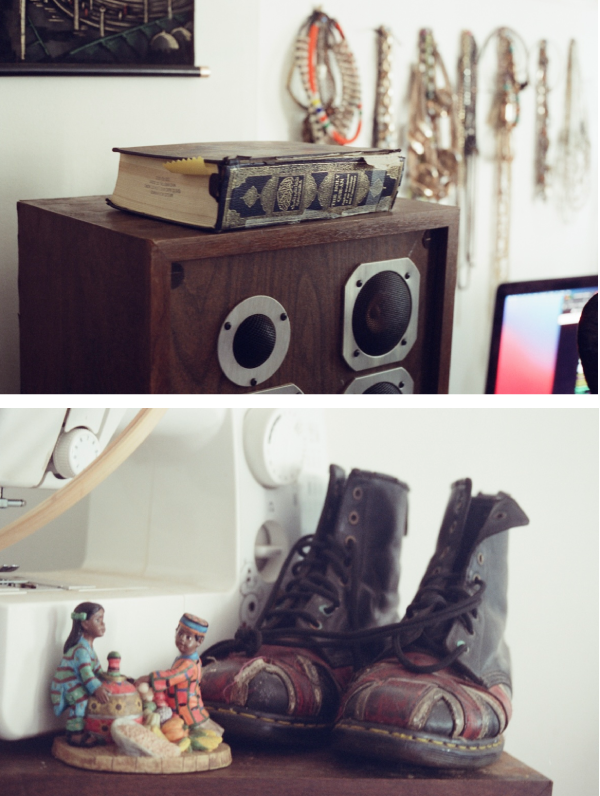
That’s one thing that resonates with me about Islam. I think that idea of prolonged struggle is really important and relevant to Black people.
Even if a group of people or person has skewed, strange thoughts, I think there are basic frameworks to life that I think are just part of nature. Returning to oneself and coming back home is readopting the faculties of the real nature out there. A Bowl for Lilith was letting go of fantasy. At the top of the tape, I’m not necessarily in a fake world, but clearly I’m like “I’m that bitch, why aren’t you fuckin’ with me are you kidding me." I feel like that energy was very ego driven, for a purposeful reason. That egoic nature of “I must be supreme/above/separate from/held on a pedestal," which I think is in Black girl raps and all of that stuff, is a place that a lot of us end up in. Some people really are just that bitch. They do have to put on some armor. But when I see people do weird hater shit, I just see a fussy little kid inside like “I wanna do that! I want that too! Why can’t I get to do it? This is why I don’t like this person.” After you realize the pathology behind haterism, you have choices there. You can either lean in, separate yourself further, or you continue to be apart of the greater expanse around without fucks to give. There’s rappers like that too. maassai is definitely of that vein. Every album, not only does she turn it, but does it in a way that changes and subverts and contorts what being a Black woman rapper is.
I appreciate your reflection, because I feel like it takes a lot to admit you were at that place.
If you are constantly going through some mess, cause hey, I’m a survivor of sexual trauma, sexual assault, battery, abuse. When I was going through the worst of it, I feel like I was putting on the most external armor, but in more of the egoic sense. I was putting on a cute beat, cute hair, cute outfit and all that, but not handling anything on the inside, and then going out there in the world and just dumping my purse instead of dumping it into a constructive fashion like the arts, a scholastic field, writing. I think as soon as I made that pivot, and started working from the inside out, instead of the outside in, I saw my life just change for the better. Even on a hard day, if I’m triggered as fuck and going through the motions, I still am able to look outside and see the trees, say alhamdulillah, be grateful for all of this, grateful for the breeze that just passed by. I’ll see two birds flying together. Maybe they friends. Things that snap me back to what I am and that I’m safe, and everything’s gonna be okay. There’s not gonna be a tomorrow, this moment will pass, it will be several days if it has to be several days. It can get cut short in the next five minutes, I could have a heart attack or aneurysm, regardless of which, I gotta be content with what I’ve lived through and feel comfortable letting go, in any aspect. So I live there now. It’s hard, especially when it comes to boundary setting, especially when it comes to reclamation, it does stir up a lot in yourself and people around you. You can’t make everybody happy. I’m inspired by people who are able to do that as well, and I’m inspired by people who are inching towards and poking at the idea of letting it all go, and just decomposing and being part of soil.
I feel like that’s a beautiful thing to desire, and I feel like I see people try to recreate that in art in really interesting ways. I also think that some people are a lot more individual than others. You see that in music. Some people’s music is from a communal experience, like a band. Other people’s music, you can tell there is one author and there may be assistants, but there’s a singular voice. La Femme Du Village has features, but it feels undeniably you. What is your attitude towards collaboration and what role does it play in your process?
I try to go for like minded collaborators. Even if we have different styles and approach, there’s still a vein of having the same want for our people. With that usually they come with their own school of thought around how and what to approach in it. Differing experiences but always leading to the same point. This time around I think it was a little bit different because you got people like EIASJA, and she is from Jersey. Jersey and Baltimore have very similar flow and pocket. Those vocal chops on “know that he won’t," that’s all her.
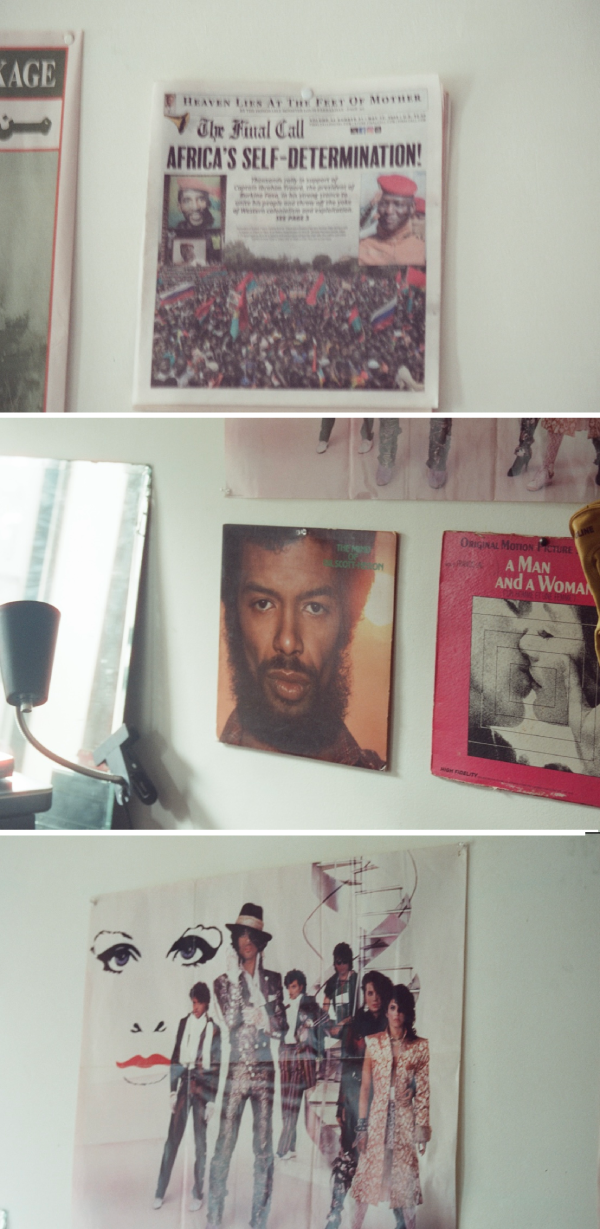
Is the album entirely self produced?
The only songs that I did not produce were “Omarion” and “all day long." “Omarion” was Tony Kill. “all day long” was a producer named Pockets from Virginia. Dream pop, super good indie bro. That was live instruments, programmed drums. Super talented kid. Super inspiring, he inspires me a lot melodically.
We come from a similar place Virginia wise. There’s such a funky energy in Virginia. You got so many groups of people when you’re in a non white space. It’s almost like a secular version of the diversity in the Masjid Muhammad community. There’s so many groups of Asian and Hispanic people, West Africans, East Africans, huge Ethiopian population in Alexandria, and we’re all in school tryna figure shit out. Our houses smell like so many different things, we have so many different kinds of art. I was Virginia for first and third grade, and especially in third grade you start riding your bike, knocking on your friends’ doors. I’d end up going in the house, the mom would cook for me sometimes, it’d be some food I never tried before. It’s Salvadorian soups I got to try, Cantonese food. I got to hear the stories of people. Virginia has the space for that and it’s not necessarily highlighted or acknowledged, but we do share so much when it comes to the POC space and it’s so beautiful.
It’s a big mix up.
Yeah. That’s what America, at least in the melting pot aspect, was marked as during the Ellis Island days. They were like “We’ll take you Romanians, Poles, and Irish." And I’m saying this as half Ethiopian. I think it changed the framework for the better, not only the cuisine, but different sounds and textures in music. A lot of these things that people love about “America” kind of expanded and I have a gratitude for it. I’m honestly just so inspired by it, and I think the East Coast and DMV in general, this tape is a kiss on the mouth to everything from Atlanta to New York.
I hear that. I really like the dance aspect of it. You said in the Bandcamp description that this is a “Afro Dance” album.
It’s East Coast dance music. I didn’t wanna be so alienating on this project. I’m not a pop person, and I consider this to be underground pop, but this is more layered in who we are and who we have here. All those different feelings and emotions that come from being amongst the people in a non capitalistic, non “I’m here to take your money.” I’m with the people--moreso just I am here, we are living next to each other, we are doing what we can with what we have.
It felt very pop to me.
I’m gonna end on this note. I want to talk about “high beam”, first official song, cause obviously there’s an intro, and the last song. On “high beam” the song with E.U, I’m sampling a Danity Kane acapella of “Damaged," with Diddy on it, and I’m sampling Alicia Keys’ “Butterflies." Going back to internal struggle, as a survivor, having this sneaking fear that you might not be put together enough emotionally to access love, receive love, give love. You got Alicia Keys going like “You give me butterflies, got me flyin’ so high in the sky." All that, with Dawn Richard who is the most vocal in the Diddy case singing, “Can you fix my heart, don’t you know it’s damaged." That juxtaposition with E.U, being from my city where a lot of damage was done, being like “can you enlighten me on what all these makings are, cause clearly you’re a beautiful person but something’s off." That’s kinda what the song is about. Mind you, I would never let a grown man read me like that if he ain’t know me, and if it was not the truth. I’m just not that type of patriarchal person. I allowed myself to be most vulnerable in my production style more so than my words. You can say so much with a sample.
That’s beautiful. I feel like I never heard someone say something like that before. It ties into the masculinity surrounding producer culture. These different ideas don’t get embraced.
The E.U. track ties into the last track. When I talk about enlightenment--I made the last track two days before drop. I sat at that Casio, hooked it up to my computer and played some chords. I had this poem I wrote about this off experience I had. I had to contextualize where a certain person is now, the art that they have made, and where they will stand after it’s been revealed they’ve done harm. “Howling wolf, indigent," meaning impoverished, “in cheap clothes. Elvis Presley in a Tiananmen pose,” Tiananmen Square, standing in front of the tank doing all the performances of a revolutionary. To me, the mentality around how we support harmful individuals is what removes a lot of femmes and non men, even trans men, from the space of art. Returning the power back to us in this non male, queer, POC space where we get so much taken from us and put onto the bodies of our male representatives. All power to the niggas that wear the ballerina slippers and be thuggin’, and there could be a trade or queer aspect to that too. But I say the difference between that and a Cakes da Killa is stark. You will never hear an openly queer artist do the numbers that a larger straight-presenting rapper would do.
Mykki Blanco v.s Playboi Carti. Even a lot of ballroom music is flawless techno.
Flawless techno, flawless bars. But you see, this is the culture, and that is the external fight. Being patient and wise during the external fight.
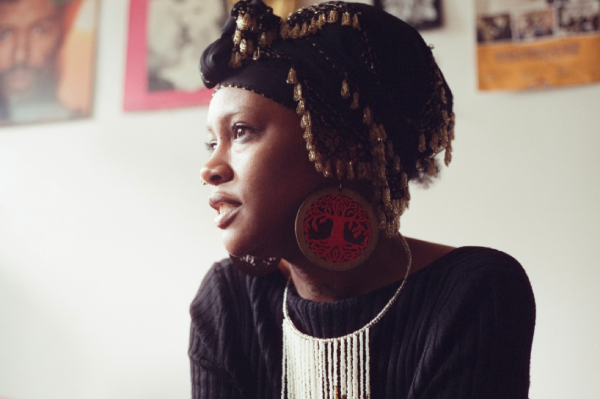
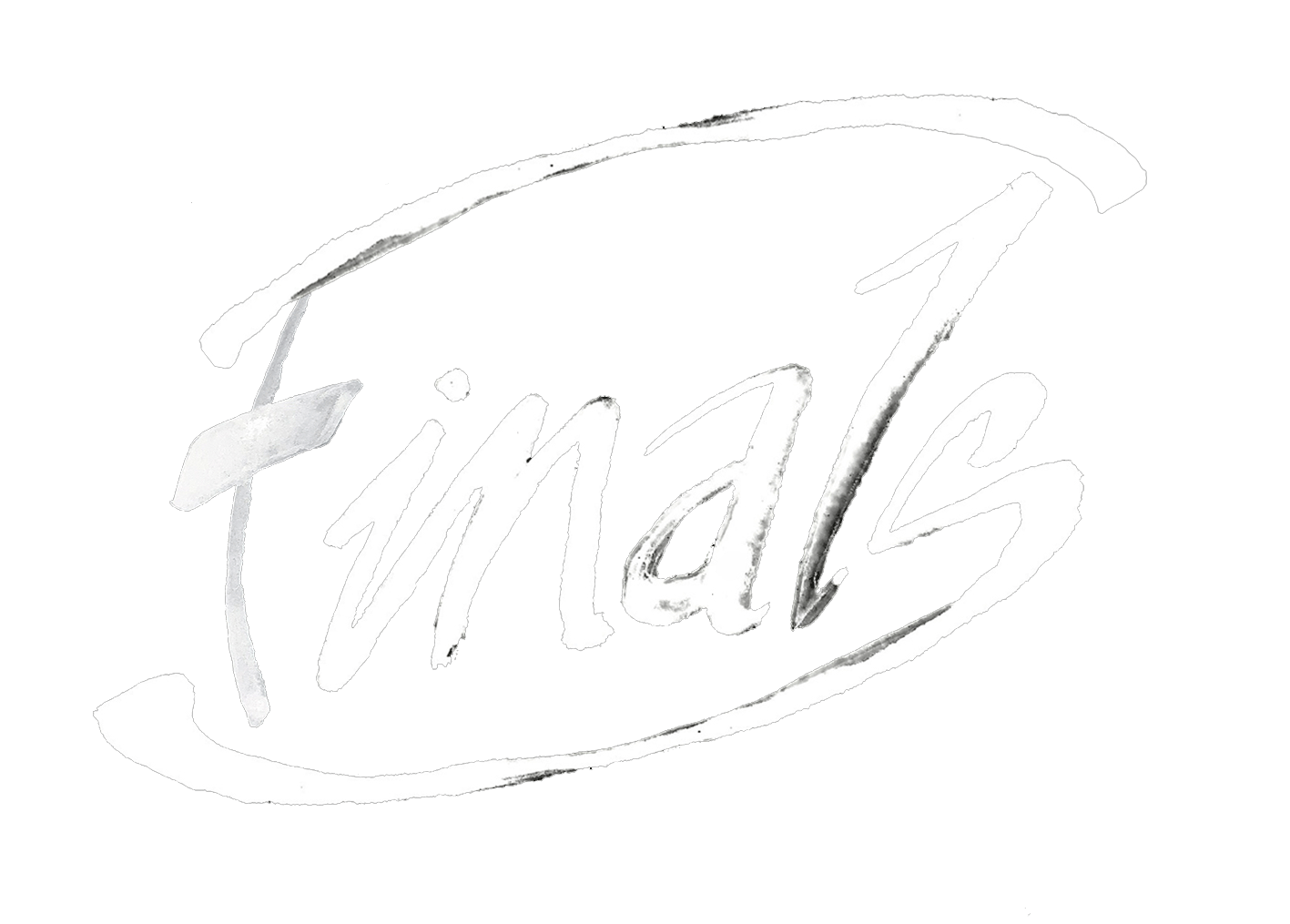
Comments
Leave a Comment